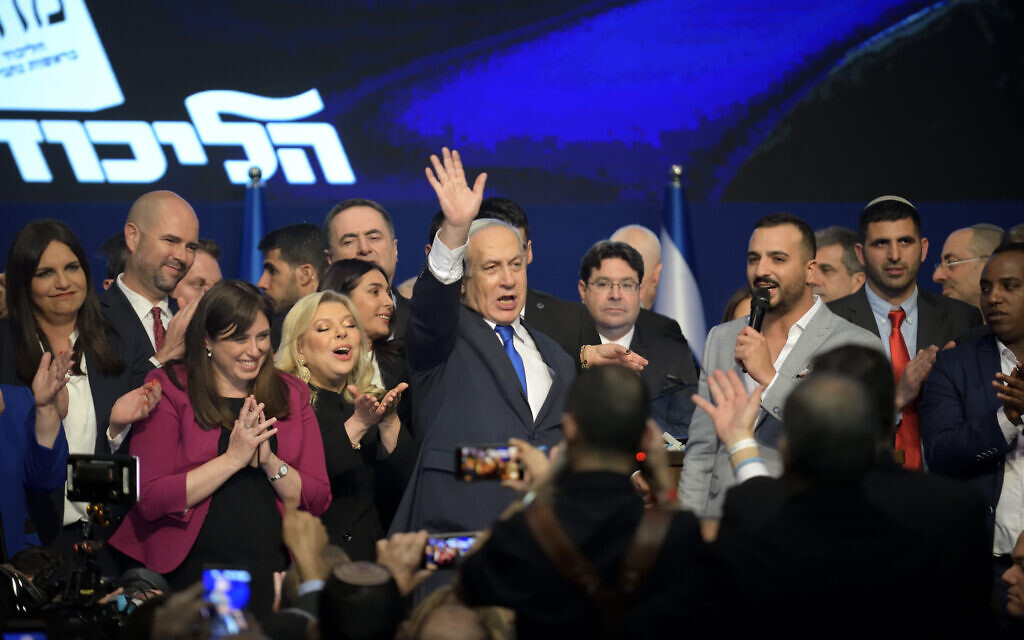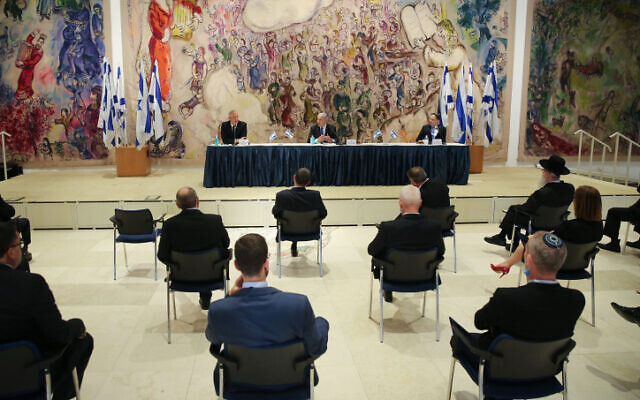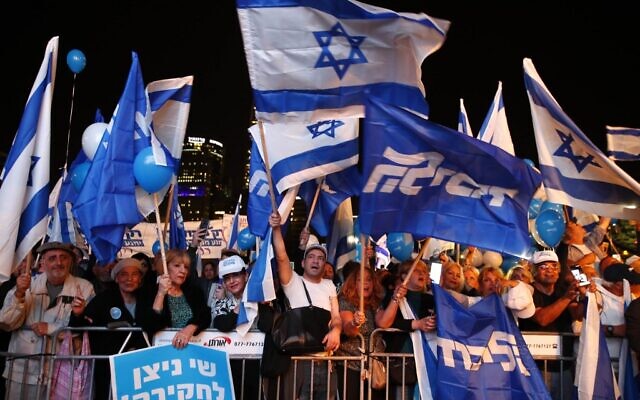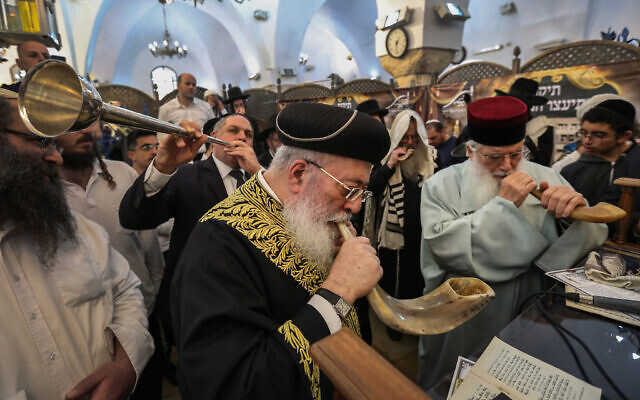PM’s allies claim the right-wing and the marginalized are in the dock with him; opponents say the rule of law is at stake; come the day, how will half the country handle defeat?
By HAVIV RETTIG GUR, TOI

Prime Minister Benjamin Netanyahu, center, is flanked by Likud lawmakers at the party’s post-election event in Tel Aviv, on March 2, 2020. (Gili Yaari/Flash90)
Prime Minister Benjamin Netanyahu has quite the busy day on Sunday.
At 11 a.m., the 35th Government gathered in Chagall Hall in the Knesset for its second-ever cabinet meeting. On the agenda: establishing the powerful cabinet committees that will deal with national security and the coronavirus crisis; appointing eight new deputy ministers; formally establishing the ministries of “settlement affairs” and “water resources” as well as establishing the “Alternate Prime Minister’s Office” for rival-turned-partner Benny Gantz (though voting to form these offices was apparently delayed at the least minute due to budgetary issues).
It’s not all cabinet assignments, of course. Item 10 refers to “Limiting the authorization for the Shin Bet to assist in the national effort to limit the spread of the novel coronavirus pathogen — extension and amendment of cabinet decisions.” The government will vote to extend in time, but limit in scope, the internal security agency’s authority to track Israelis for the purpose of keeping tabs on the spread of the virus.
Then there’s the roughly NIS 800 million ($226 million) the cabinet will be approving for the Jerusalem municipality to offset the capital’s enormous deficit.
A busy day, and no wonder. Netanyahu has a new government to get underway, a coronavirus-wracked economy to rehabilitate, a country to run.

Israel’s 35th government holds a cabinet meeting while keeping social distancing regulations at the Knesset, on May 17, 2020. (Alex Kolomoisky/POOL)
But at 3 p.m. that busy agenda was to be put on hold. Netanyahu was to arrive at the Jerusalem District Court to hear the criminal charges against him and formally confirm to the court that he understands them. It is the moment of legal ritual that will officially launch the first-ever trial of a sitting Israeli prime minister.
That juxtaposition — Netanyahu the confident helmsman of the ship of state and Netanyahu the defendant in three corruption cases — has accompanied the prime minister since his first questioning by police in January 2017.
In recent months, as the trial drew closer, and especially since the formal announcement in November that he would be indicted, Netanyahu has tried to bridge that gap, to reclaim his dignity and buttress his political support for the bruising legal fight ahead.
His principal means has been a campaign focused on two enormous claims. The first: He and his supporters have accused his accusers — the state prosecution, police and, in recent weeks, judges in his trial — of a conspiracy to remove him from power using false charges.
“Many people worked very hard, on the left and in the media, you did everything to get that picture tomorrow [Sunday] of the prime minister in a courtroom,” claimed Likud MK Miki Zohar, speaking to Channel 12’s “Meet the Press” on Saturday night. “You couldn’t beat him at the ballot box, so you took a more twisted path. The police and the prosecution work for you, it was a ‘full-time job.’ You worked in perfect synergy,” he said.

Supporters of Israeli Prime Minister Benjamin Netanyahu at a rally held under the banner ‘protesting the coup’ in Tel Aviv, on November 26, 2019. (Jack Guez/AFP)
That narrative now dominates the coverage of the trial in right-wing media. Channel 20 has called its Sunday afternoon broadcast of the opening of the trial “The Attempted Ouster.” Those words will headline and frame the broadcast, with the channel’s rhetoric over the weekend making clear that it intends to toe the line unquestioningly in Netanyahu’s favor throughout the day.
‘Hegemonies everywhere’
But there is a second and deeper claim Netanyahu has made about his trial, and that too will come to a head on its opening day.
On Thursday, in an extraordinary moment of television, Channel 13 Haredi affairs analyst Dr. Avishay Ben Haim gave voice to this claim, explaining during a broadcast why he viewed the Netanyahu trial as “my trial.”
Ben Haim wrote his doctorate on Shas spiritual leader Rabbi Ovadia Yosef and has helped coin the term “Second Israel” to describe long-marginalized Mizrahi (or “Eastern”) Jewish communities kept far from the centers of political and economic power by an Ashkenazi elite in the first decades of Israel’s existence. Ben Haim is a fervent supporter of secular, Ashkenazi Netanyahu, describing him as the “elitist champion” that Second Israel has selected to take its fight to the rest of the Ashkenazi elite.
“The Netanyahu trial isn’t actually a legal event,” he explained in the widely seen broadcast, “but a social one. It is a climactic moment in the hegemony’s effort to weaken the political system in order to diminish the right of Israelis who don’t accept its authority and values to participate in democracy.”

Sephardi Chief Rabbi of Jerusalem Rabbi Shlomo Amar, Rabbi Yechiel Abuchatzeira and rabbis from the Or Hashravi Yeshiva in Meron take part in a special prayer to stop the coronavirus pandemic, at the Rashbi gravesite in Meron, northern Israel, March 9, 2020. (David Cohen/Flash90)
“I’ve discussed in the past the process by which Second Israel’s various attempts to participate in the country’s democratic life, from Wadi Salib to the Yemenite children to Shas, were criminalized. All were depicted as a criminal event. But it didn’t end there. Hegemonies everywhere fight the forces that threaten their rule, and sometimes respond with instinctive belligerence.
“The Netanyahu trial must be placed, therefore, in a broad historical context, not a legal context but a social one. In this sense, the Netanyahu trial isn’t his private trial, but mine too. So in this sense, and only in this sense, on Sunday it isn’t Netanyahu who goes on trial, but me. On Sunday my trial begins. A trial begins against me and against many, many who understand and feel that this isn’t a legal struggle whose goal is justice, but a hegemonic struggle whose goal is injustice.”



On this subject, see U.S. top criminal lawyer Nathan Lewin’s column in Israel Hayom and also JNS.org.
” Would Netanyahu’s trial be different in an American court?
No one will ever know whether a randomly selected group of Israelis would have charged the Israeli prime minister with committing crimes if Israel had a grand-jury procedure.
By Nathan Lewin Published on 05-24-2020 19:06 Last modified: 05-24-2020 19:08″ Lewin points out that an indictment in U.S. courts must be approved by a grand jury of ordinary citizens, and conviction requires a grand jury of ordinary citizens. This limits the likelihood of a biased judgment. In Israel, the judges have unlimited discretion, and the prosecutors are free to prosecute wthout a review of their finding by ordinary citizens. This creates much more vulnerability by the defendant to judicial bias.